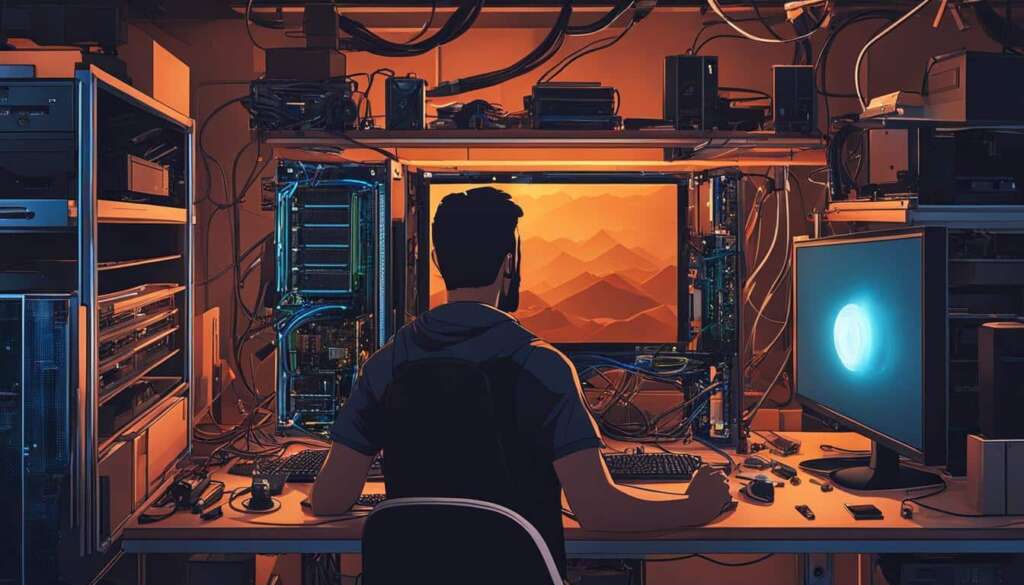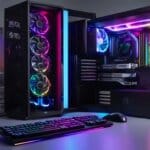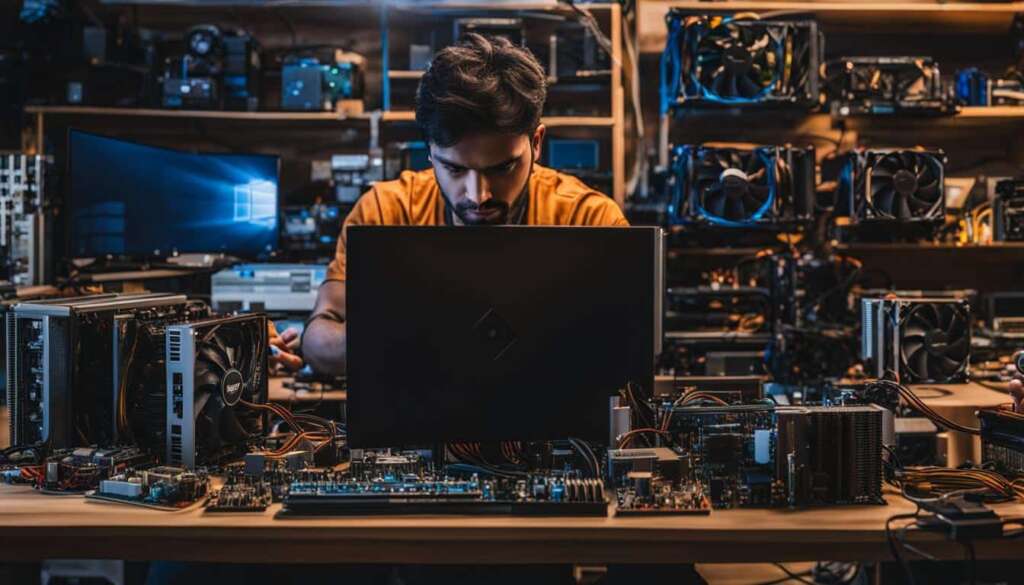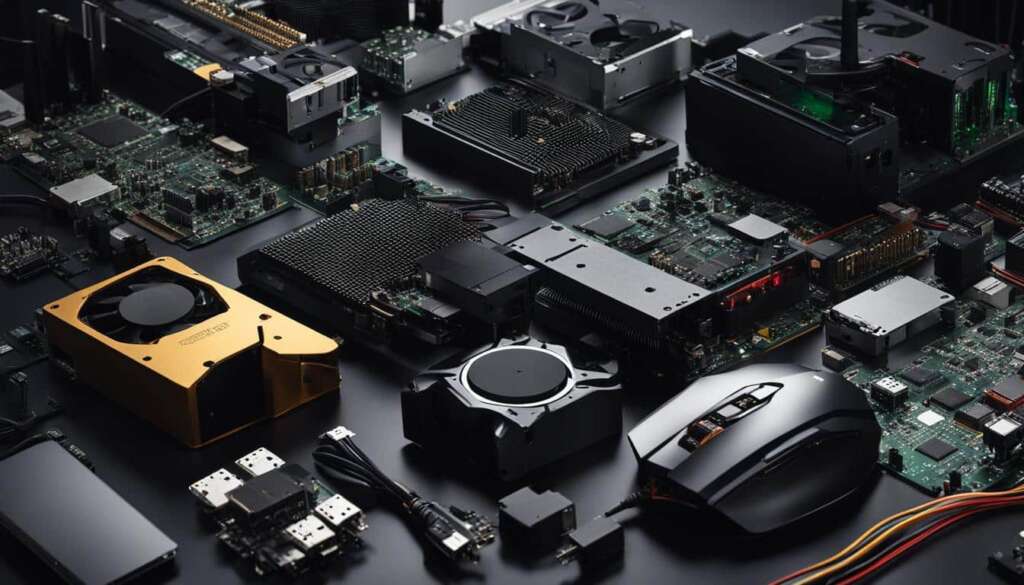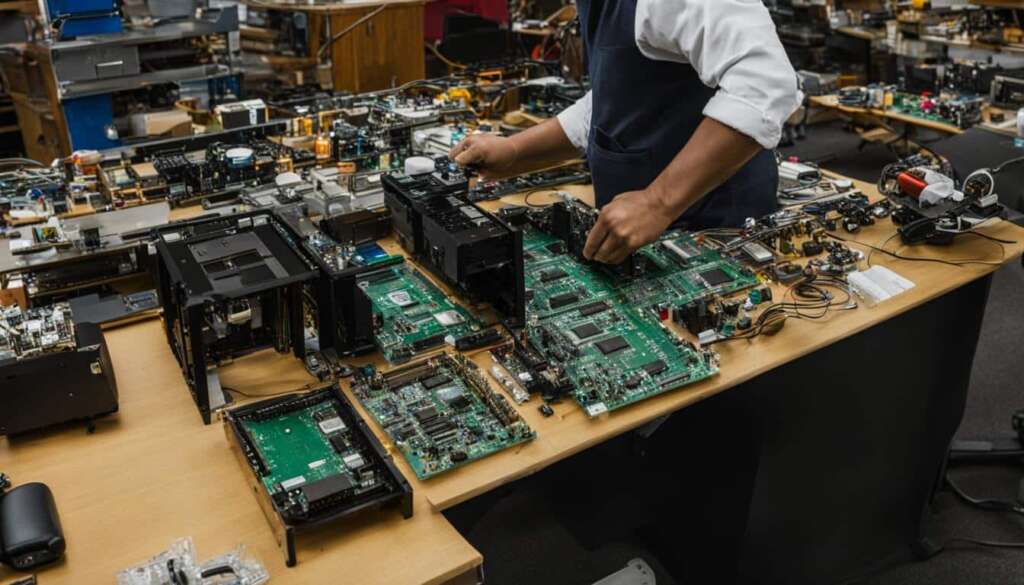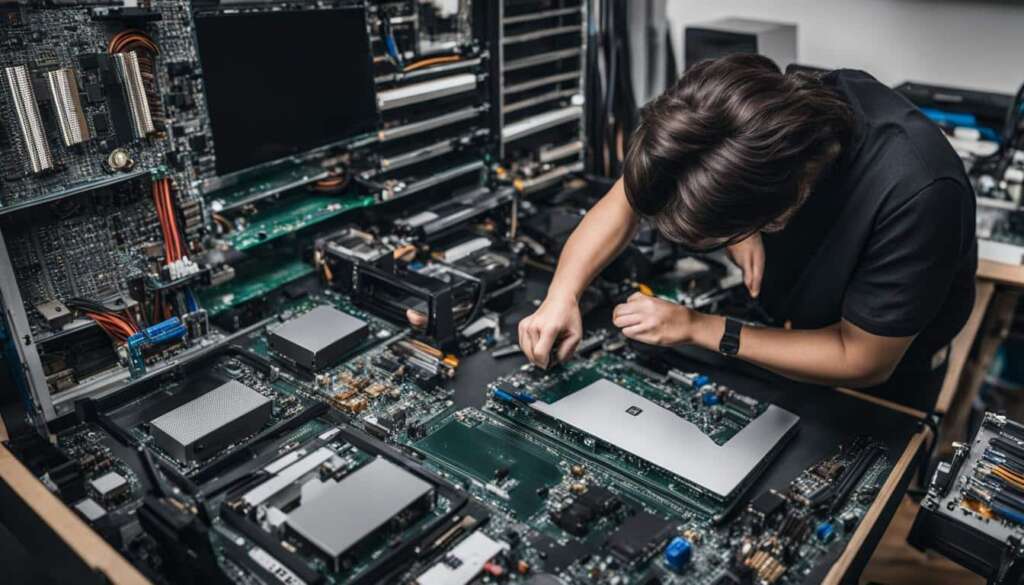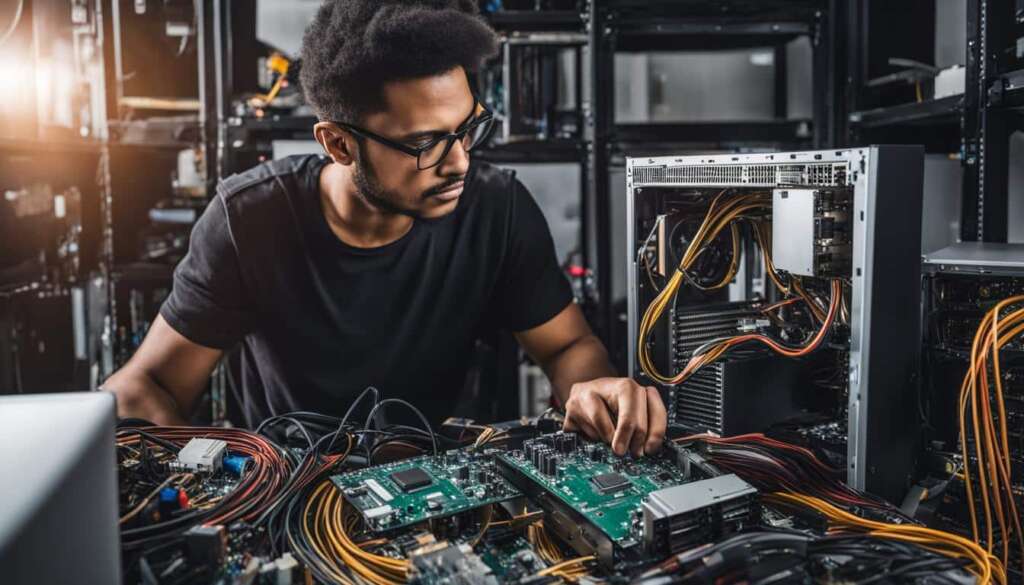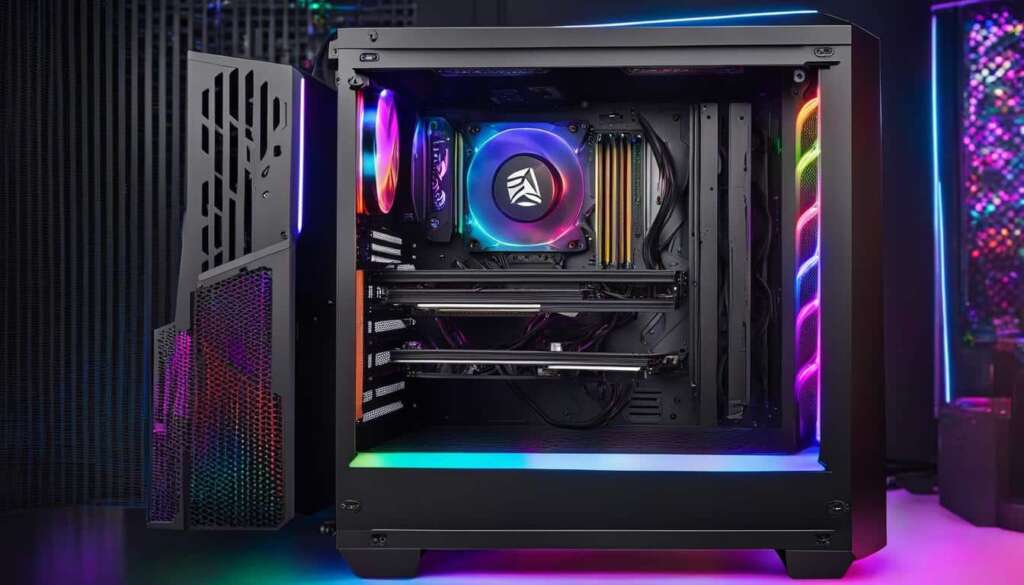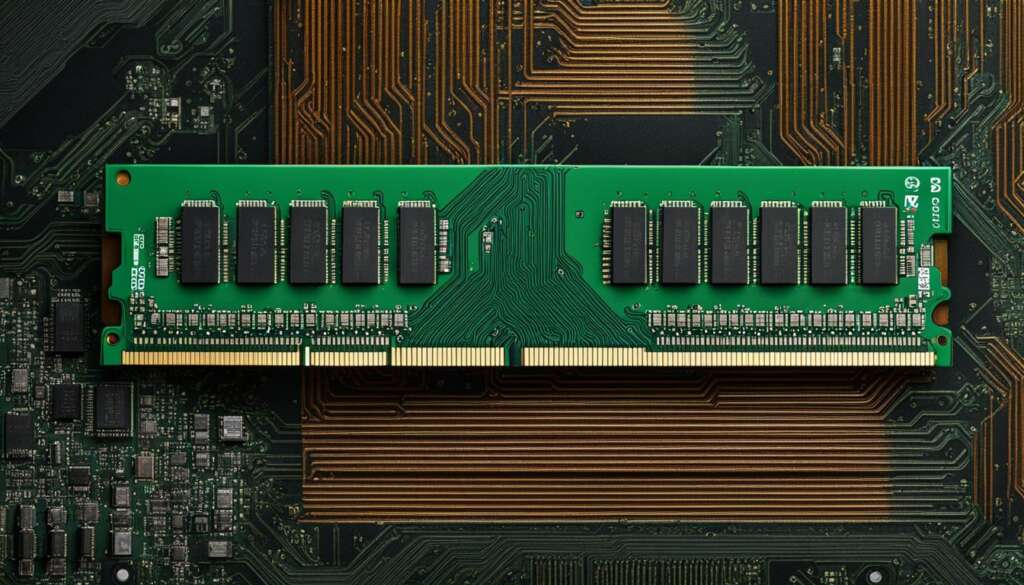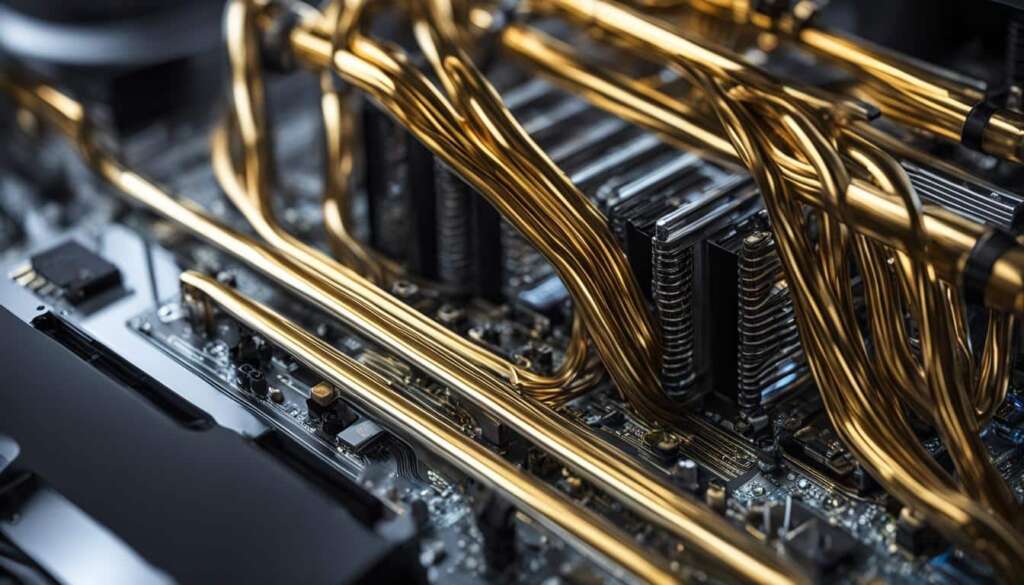Table of Contents
Building a PC involves considering various components and their associated costs. Factors like the intended purpose, desired performance, and the latest technological innovations all impact the total expenses. Crafting a computer tailored to your specific needs can provide customization, flexibility, and higher performance. It can also be a rewarding and educational project. In terms of components, the processor, graphics card, motherboard, RAM, storage (SSD/HDD), power supply unit, PC case, and CPU cooler are all important considerations. Prices can vary depending on the specifications and brands chosen. It’s essential to assess your priorities and analyze the financial aspects before embarking on this endeavour.
Key Takeaways:
- Building a PC allows for customization, flexibility, and higher performance.
- The cost of a PC depends on factors such as the intended purpose, desired performance, and component choices.
- Components like the processor, graphics card, motherboard, RAM, and storage impact a PC’s overall cost.
- Assessing priorities and analyzing the financial aspects is crucial before starting a PC build.
- Consider building a gaming computer for better value, customization, upgradability, and potentially longer lifespan.
Exploring the Key Components of a PC
When it comes to building a PC, understanding the key components is essential for a thorough cost analysis. Each component plays a crucial role in the overall performance and functionality of the computer. Let’s explore some of the main components and their significance.
Processor (CPU)
The processor, also known as the CPU, is the brain of the computer. It executes instructions and performs calculations, directly impacting the PC’s performance and capabilities. The CPU market offers a wide range of options, from budget-friendly processors suitable for everyday tasks to high-end models designed for intensive gaming and professional applications.
Graphics Card (GPU)
The graphics card, also known as the GPU, is particularly important for high-end visual performance. It handles complex rendering tasks and ensures smooth graphics in gaming, graphic design, and other graphics-intensive applications. The GPU market offers various options, with budget-friendly cards for casual gamers and powerful models for enthusiasts seeking the best performance.
Motherboard
The motherboard acts as the foundation for all other components. It provides the platform for components to connect and communicate, affecting the system’s functionality and compatibility. The motherboard market offers options for different CPU and RAM types, expansion slots, connectivity options, and other features, allowing users to tailor their PC to their specific needs.
RAM
RAM, or Random Access Memory, serves as temporary storage for data and programs in use. Having sufficient RAM is crucial for smooth multitasking and overall system performance. The RAM market offers various capacities and speeds, allowing users to choose the right balance between affordability and performance.
These are just a few of the key components that form the foundation of a PC. Understanding their role and significance is essential when analyzing the cost of building a PC. By carefully selecting components that meet your needs and budget, you can find the best PC deals and create a system that delivers optimal performance.
The Cost of Building a PC: Table of PC Component Prices
Understanding the cost of building a PC involves considering the prices of individual components. To assist in budget planning, here is a table summarizing the price ranges for different PC components:
| Component | Price Range |
|---|---|
| CPU | $60 – $1200 |
| Motherboard | $50 – $800 |
| RAM | $30 – $600 |
| Storage (SSD) | $30 – $1000 |
| Storage (HDD) | $30 – $500 |
| Graphics Card | $100 – $1500 |
| Power Supply | $40 – $500 |
| PC Case | $30 – $500 |
As the table illustrates, prices can vary considerably depending on the specifications and brands chosen. It’s important to analyze your needs and prioritize components based on your budget. By understanding these price ranges, you can make informed decisions and find the perfect PC within your budget.
Whether you’re looking for budget-friendly options or high-end components, comparing prices online can be a helpful strategy. Many online retailers offer competitive prices and deals that can help you save money. It’s also worth considering purchasing components from different sources to take advantage of the best prices available.
When budgeting for a PC build, don’t forget to account for additional expenses such as peripherals, operating system, and software. These costs can add up, so it’s important to factor them into your overall budget. With careful planning and research, you can find affordable PC options that meet your specific requirements without exceeding your budget.
The Cost of Constructing a Gaming Computer
Building a gaming computer can be an exciting endeavor, but it’s important to consider the cost implications. The price of constructing a gaming PC can vary depending on several factors, including the desired performance level and the quality of components chosen. A low-end gaming PC can be built for around £500 to £700, while a mid-range system may cost between £800 and £1,200. On the other hand, high-end gaming PCs equipped with top-of-the-line components can exceed £2,000.
When considering the cost, it’s crucial to take into account the specific requirements for gaming. Components such as a high-end graphics card, a powerful CPU, and ample RAM and storage can significantly impact the overall price. It’s worth noting that building a gaming PC allows for better customization and upgradability, which can provide long-term value compared to pre-built systems.
While the initial investment in building a gaming computer may be higher, it offers the flexibility to choose components that align with individual preferences and budget constraints. By carefully selecting components and comparing prices, it’s possible to find affordable options that meet specific gaming requirements.
Table: Price Ranges for Gaming PC Components
| Component | Price Range (£) |
|---|---|
| Processor (CPU) | £60 – £1200 |
| Graphics Card (GPU) | £100 – £1500 |
| Motherboard | £50 – £800 |
| RAM | £30 – £600 |
| Storage (SSD) | £30 – £1000 |
| Storage (HDD) | £30 – £500 |
| Power Supply | £40 – £500 |
| PC Case | £30 – £500 |
It’s important to note that the prices listed in the table are approximate ranges and can vary depending on factors such as brand, specifications, and current market trends. To determine the specific cost of constructing a gaming computer, it’s advisable to conduct thorough research, compare prices from different retailers, and consider any additional accessories or peripherals required for an optimal gaming experience.
Conclusion
Building a PC involves considering various components and their costs. The price range for each component can vary depending on specifications and brands chosen. Understanding the key components such as the processor, graphics card, motherboard, RAM, storage, power supply unit, PC case, and CPU cooler is essential in assessing the total expenses for a PC build.
Budgeting and prioritising needs can help in finding the perfect PC within a given budget. While the cost of building a gaming computer can be higher upfront, it offers better customisation, upgradability, and potentially longer lifespan compared to pre-built systems.
By carefully selecting components and comparing prices, it is possible to find affordable PC options that meet individual requirements. Whether you are looking to build a PC for gaming, graphic design, or general use, weighing the costs of each component and considering your needs will help you make an informed decision.
FAQ
How much does it cost to build a PC?
The cost of building a PC can vary depending on the desired performance level and component quality. A low-end gaming PC can be built for around $500 to $700, while a mid-range system can cost $800 to $1,200. High-end gaming PCs with top-of-the-line components can exceed $2,000.
What are the key components of a PC?
The key components of a PC include the processor (CPU), graphics card (GPU), motherboard, RAM, storage (SSD/HDD), power supply unit, PC case, and CPU cooler.
How do component prices vary?
Component prices can vary depending on the desired specifications and brands chosen. For example, CPUs can range from $60 to $1200, motherboards from $50 to $800, RAM from $30 to $600, storage (SSD) from $30 to $1000, storage (HDD) from $30 to $500, graphics cards from $100 to $1500, power supplies from $40 to $500, and cases from $30 to $500.
How can I find an affordable PC within my budget?
By understanding the price ranges for different components and comparing prices, it is possible to find affordable PC options that meet your individual requirements.
Why should I consider building a gaming PC?
Building a gaming PC provides better value in the long run with customization, upgradability, and potentially longer lifespan compared to pre-built systems.


